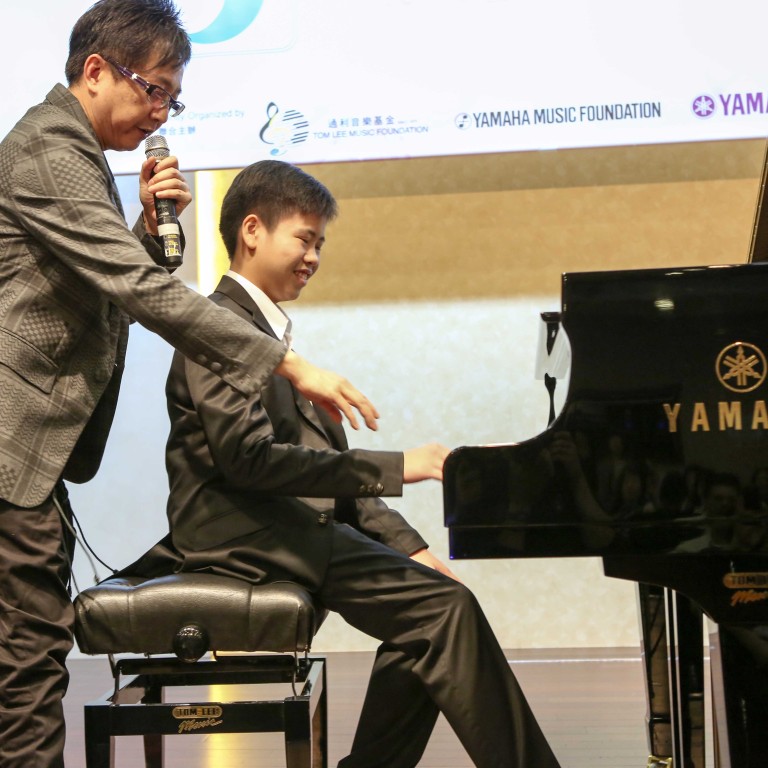
Budding young composers develop creativity through music
What kind of music are young children likely to create? Junior Original Concert, an annual event organised by the Yamaha Music Foundation, provides a glimpse of their range.
Since the first concert was held in Japan in 1972, it has showcased the compositions of budding Beethovens to audiences around the globe. The idea is to develop children’s creativity and ability for self-expression through music. An Asia-Pacific event was established in 1991, and this year’s event was held in Hong Kong – a decade since the city last hosted the concert.
In the spotlight were 12 children aged between eight and 15 years old, whose compositions were selected from 10,000 submissions from around the region. Typically, a first cut of entrants are invited to perform before a panel of music teachers in each country; and they send tapes of shortlisted music to Yamaha Japan, which makes the final selection.
This year’s youngsters came from the mainland and Taiwan, nearby countries such as Indonesia, Malaysia, Singapore, South Korea and Thailand, but also as far away as Australia and Mexico. As the host city, Hong Kong fielded three candidates: 8-year-old Kwan Nok-ching, Jasmine Tso Yuen-see, 10, and Anson Wong Ying-shun, who is 12.
Teaching kids how to write music would help build up a basic tool. It’s a very creative thing
Singer-songwriter Anthony Lun Wing-leung, who has written many of Hong Kong’s pop hits over the past two decades, spent an afternoon with the young composers before their concert just over a week ago, co-organised by the Tom Lee Music Foundation.
“[The JOC] is such a wonderful opportunity because you don’t see many chances being given to young composers – or any composers actually. It shows that they all have imagination. We just need to give them a boost,” he says.
Nok-ching, normally a quiet and shy child, came alive when she was asked to play a part of her entry, Enchanted Forest. Swaying to the melody and deftly fingering the electone keyboard, she was clearly immersed in the music. She started playing the electronic keyboard when she was three, and has since written three pieces of music. “I like the electone because it can make a lot of different sounds, which is so much fun,” she says.
The young composers drew inspiration from a variety of sources – fairy tales, funny situations at home, television shows or their hometowns. Xu Piaopiao, an 11-year-old from Shanghai, often looks to her idols, including mainland singer-songwriter Wang Feng and pop star Justin Bieber. But for , the work she presented in Hong Kong, the idea came from the soundtrack to the latest movie.
Piaopiao, who has played the piano since she was four years old, says she enjoys tickling the ivories: “It’s the easiest instrument to learn. I like it because it’s the ‘king of music’”
Perhaps reflecting her approaching adulthood, Maria Jaloma, a 15-year-old from Mexico, says: “The most inspirational moment to compose is when I am saddened with hard feelings.”
Some might feel musical talent is a natural gift, after all, Mozart wrote a miniature allegro when he was just five years old. But Lun reckons there’s a lot more to it than just being a genius.
“This is my belief; I feel that prodigal talent is only 10 per cent and then 90 per cent is hard work.”
Lun recalls an anecdote that his music teacher, Hungarian pianist György Sándor, told of the latter’s mentor, composer Béla Bartók, to illustrate the point.
“When Bartók composed, he usually buried himself in a room and then after a week, he would come up with this tiny two to three-minute piece in his micro-cosmos,” he says. “That is how you sit down for a long time and come up with something.”
Still, composing a piece of music is no easy matter, even for adult musicians. Are these children starting too early?
“Teaching kids how to write music would help build up a basic tool and help them analyse what make a piece of good music and what could be a piece of bad music,” Lun says. “They would know. Like drawing, it’s a very creative thing. You just paint or draw whatever you can. Music composition is the same.”
But to the many parents intent on bulking up their children’s resumes, Lun offers some suggestions: don’t pressure the kids, but set discernable goals and help guide them with rules and steps.
“Kids have a lot of ego. If you challenge them with given guidelines, they will always say ‘I’m gonna show you I can do this. I’m gonna show you how good I am.’ It’s like this.”
